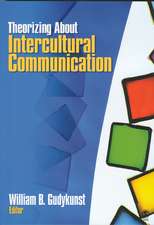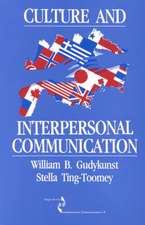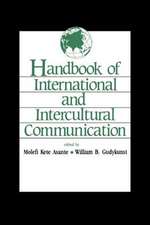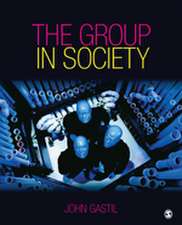Bridging Differences: Effective Intergroup Communication
Autor William B. Gudykunsten Limba Engleză Hardback – 16 sep 2003
New to the Fourth Edition:
- Expanded discussions of several topics such as changing intergroup expectations; cultural differences in attribution processes; cultural and ethnic differences in conflict; cultural differences in indirect messages; cultural differences in uncertainty management; empathy; ethnic and cultural identities; face and its relationship to conflict management; intergroup communication effectiveness; intergroup conflict; intergroup biases; negotiating means; perceptual processes; and prejudice
- New material has been added on civic engagement; community in public life; diversity and community; the content of stereotypes; communication in romantic relationships; cultural differences in effective communication; and theoretical explanations for prejudice
- Pedagogical features include end-of-chapter study questions, self-assessment questionnaires, open-ended questions to stimulate readers to think about their implicit theories, and written skill exercises to increase students' skill development
Preț: 1321.04 lei
Preț vechi: 1809.63 lei
-27% Nou
252.77€ • 263.94$ • 208.74£
Carte tipărită la comandă
Livrare economică 15-29 aprilie
Specificații
ISBN-10: 0761929363
Pagini: 448
Dimensiuni: 152 x 229 x 25 mm
Greutate: 0.79 kg
Ediția:Fourth Edition
Editura: SAGE Publications
Colecția Sage Publications, Inc
Locul publicării:Thousand Oaks, United States
Cuprins
1. Communicating with Strangers
An Overview of the Communication Process
Managing Uncertainty and Anxiety
Effective Communication
Study Questions
Applications
Notes
2. Understanding Cultural Differences
Culture
Individualism-Collectivism
Other Dimensions of Cultural Variability
Cultural Identity
Study Questions
Applications
Notes
3. Understanding Group Differences
Social Identities
Ethnicity and Ethnic Identity
Identities Based on Gender, Disability, Age, and Social Class
Study Questions
Applications
Notes
4. Having Expectations for Strangers
The Nature of Expectations
Stereotypes
Intergroup Attitudes
Changing Our Intergroup Expectations
Study Questions
Applications
Notes
5. Attributing Meaning to Strangers' Behaviors
The Perception Process
The Attribution Process
Culture and Attributions
Personality Factors Influencing Our Attributions
Improving the Accuracy of Our Attributions
Study Questions
Applications
Notes
6. Exchanging Messages with Strangers
The Nature of Language and Nonverbal Messages
Cultural Differences in Language Usage
Cultural Differences in Nonverbal Communication
Language Usage in Communicating with Strangers
Improving the Quality of Messages Exchanged with Strangers
Study Questions
Applications
Notes
7. Being Perceived as Competent Communicators
Defining Perceived Competence
Motivation
Knowledge
Skills
Study Questions
Applications
Notes
8. Managing Intergroup Conflict
The Nature of Conflict
Cultural and Ethnic Differences in Conflict
Face Concerns
Characteristics of Intergroup Conflict
Managing Intergroup Conflict
Study Questions
Applications
Notes
9. Developing Relationships with Strangers
Similarities and Differences Across Groups
Intergroup Relationships
Intergroup Relationship Development
Romantic Relationships
Study Questions
Applications
Notes Notes Notes
10. Building Community with Strangers
The Nature of Community
Characteristics of Community
Community and Public Life
Civic Engagement
Diversity and Community
Ethical Issues in Building Community with Strangers
Principles of Community Building
Study Questions
Applications
Notes
REFERENCES
INDEX
ABOUT THE AUTHOR
Notă biografică
William B. Gudykunst (Ph.D., Minnesota, 1977) is Professor of Speech Communication at the College of Communications, California State University, Fullerton. Bill has written and edited numerous works for SAGE, including the Handbook of Intercultural and International Communication, 2/e, and Bridging Differences: Effective Intergroup Communication, 3/e as well as the best-selling introductory undergraduate texts Building Bridges: Interpersonal Skills for a Changing World (Houghton Mifflin) and Communicating with Strangers: An Approach to Intercultural Communication, 3/e (McGraw-Hill). He is extremely well known in the discipline and is one of its most prolific writers/scholars in the areas of intercultural communication and human communication theory.
Descriere
Designed for students taking courses in Intercultural Communication or Intergroup Communication, Bridging Differences is also useful for many courses in Cultural Studies, Anthropology, Sociology, and Management.























